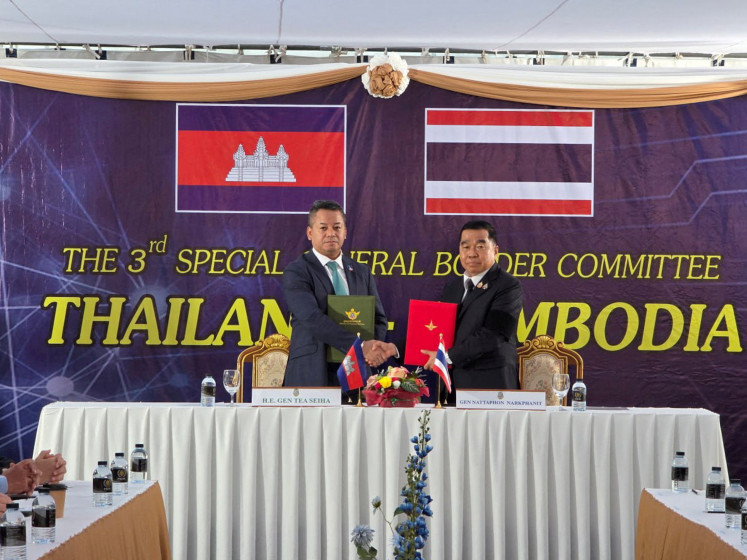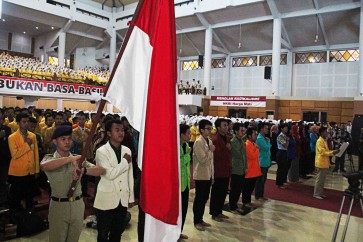Popular Reads
Top Results
Can't find what you're looking for?
View all search resultsPopular Reads
Top Results
Can't find what you're looking for?
View all search resultsIndonesia: Between a rock and a hard place?
So is Indonesia now between the rock (of state authoritarianism) and a hard place (Islamic radicalism)? Or are they merely two sides of a coin to buttress the oligarchic power structure that currently rules Indonesia?
Change text size
Gift Premium Articles
to Anyone
 Against radicalism: Thousands of students from the Semarang State University and representatives of universities across Central Java and Yogyakarta declare their faith in the Unitary State of the Republic of Indonesia and commitment to fight against radicalism in an event in Semarang. (JP/Suherdjoko)
Against radicalism: Thousands of students from the Semarang State University and representatives of universities across Central Java and Yogyakarta declare their faith in the Unitary State of the Republic of Indonesia and commitment to fight against radicalism in an event in Semarang. (JP/Suherdjoko)
We have a saying: Cacing saja kalau diinjak pasti menggeliat (even a worm will squirm when trodden upon).
Well, we Indonesians are certainly not worms. Radicalism and Islamic conservatism have been on the rise for a while now, not just treading, but stomping on other people’s beliefs, customs, traditions and human rights.
There’s always been resistance toward Islamic radicalism and conservatism, except that before it was simply a way of being: the moderate and inclusive Islam that Indonesia had long been famous for.
Various institutions that promote religious tolerance, pluralism and human rights abound, for example, the MAARIF Institute, the Indonesian Conference on Religion and Peace, the Wahid Institute, the Leimena Institute and several Muslim feminist NGOs such as Fahmina, Rahima and Puan Amal Hayati. Even the two largest Muslim organizations in Indonesia put forward their own “brand” of moderate Islam. Nahdlatul Ulama (NU) coined the term Islam Nusantara (Islam of the Archipelago), which has existed since the 16th century but was “officially” relaunched in 2015. Muhammadiyah, the second-largest Muslim organization after the NU, used the term Islam Berkemajuan (Progressive Islam) also in 2015.
However, in the age of social media, the resistance has come up on … YouTube! Not surprisingly, considering its nationwide penetration of 88 percent, it’s one of the best ways to get your ideas or products across to the public at large.
Recently I discovered the delightfully bold and refreshing Cokro TV (cokro.tv), a YouTube channel presenting short videos addressing some of the most vexing current sociopolitical issues in Indonesia today, many related to Islam.
One of the first I watched, dated last Dec. 30, was a five-minute video by Ade Armando on “Lessons of 2019: Fraudsters using religion as a mask”. How easy it is in Indonesia, he says, to use religion to con people, just by giving it a religious label like “sharia” or “halal”. He cites various examples, including how religion was used to take down former Jakarta governor Basuki “Ahok” Tjahaja Purnama, a Christian ethnic Chinese. Likewise, Anies Baswedan became Jakarta governor by capitalizing on Ahok’s downfall, and getting conservative Islamic forces to rally behind him.

















